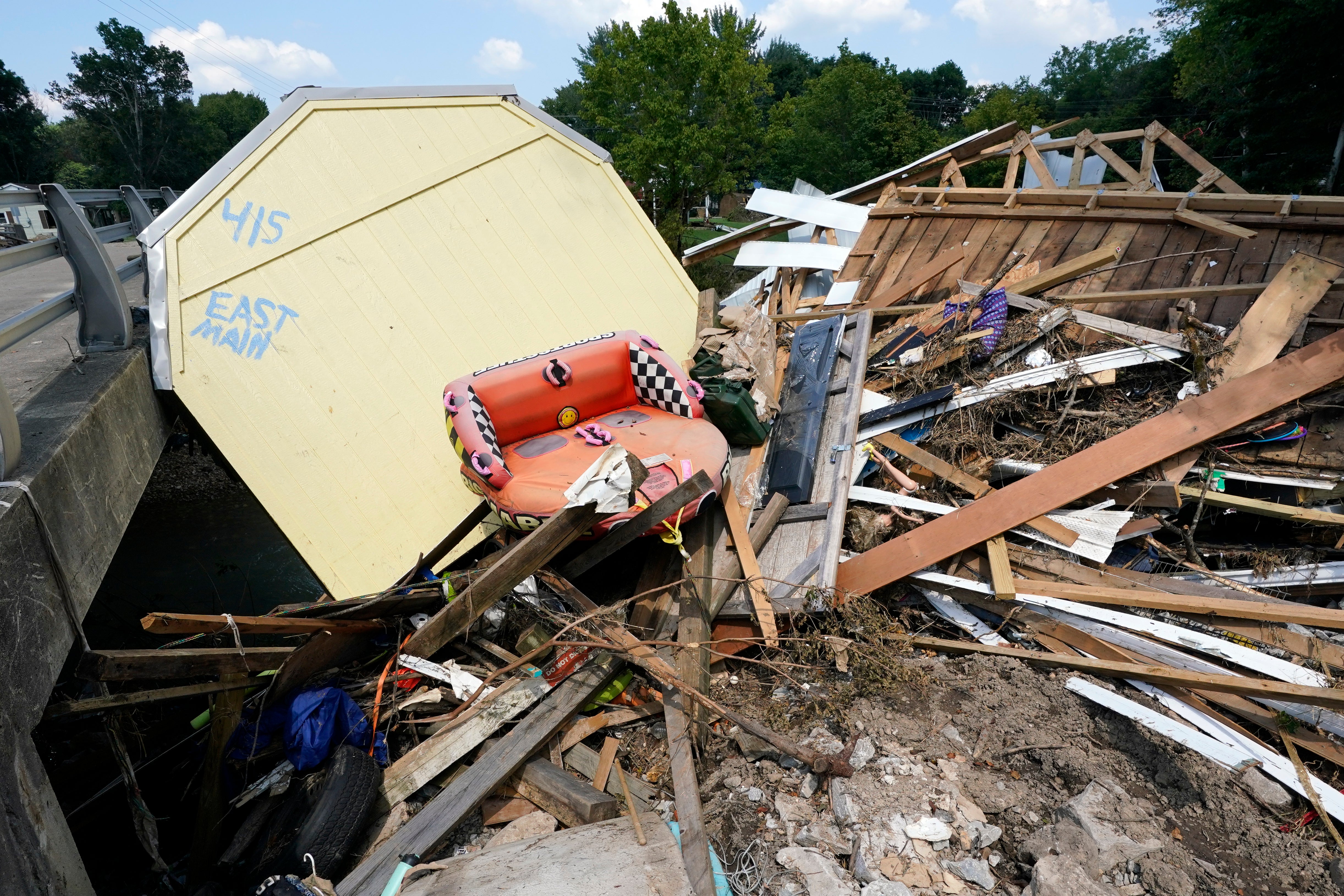Suit blames railroad bridge clog in deadly Tennessee floods
Ten families are suing CSX Transportation for up to $450 million over flooding that killed 20 people in Tennessee last year, claiming a clog underneath the railroad giant’s bridge in rural Waverly allowed a “deadly tidal wave” to form

Your support helps us to tell the story
From reproductive rights to climate change to Big Tech, The Independent is on the ground when the story is developing. Whether it's investigating the financials of Elon Musk's pro-Trump PAC or producing our latest documentary, 'The A Word', which shines a light on the American women fighting for reproductive rights, we know how important it is to parse out the facts from the messaging.
At such a critical moment in US history, we need reporters on the ground. Your donation allows us to keep sending journalists to speak to both sides of the story.
The Independent is trusted by Americans across the entire political spectrum. And unlike many other quality news outlets, we choose not to lock Americans out of our reporting and analysis with paywalls. We believe quality journalism should be available to everyone, paid for by those who can afford it.
Your support makes all the difference.Ten families are suing CSX Transportation for up to $450 million over flooding that killed 20 people in Tennessee last year, claiming a clog underneath the railroad giant's bridge in rural Waverly allowed a “deadly tidal wave” to form.
The lawsuit filed Tuesday in circuit court in Humphreys County claims the bottlenecked culvert and the earthen railbed supporting CSX's elevated tracks formed a man-made dam, impeding the normal flow of Trace Creek. When the railbed collapsed, it released a "a torrent of millions of gallons of water" during the August 2021 floods, the lawsuit says.
In a statement, CSX declined to comment on specifics of the lawsuit, but called the rain in August 2021 an “an unprecedented and extraordinary event," while offering their “most heartfelt thoughts" to the families affected. The company said its track and related infrastructure are “maintained and regularly inspected in accordance with CSX policies, which meet or exceed federal regulations.”
More than 500 homes and 50 businesses suffered damage, as gushing water swept people away and left others stranded on trees, in attics and on rooftops. The National Weather Service said nearly 21 inches (53 centimeters) of rain fell in 24 hours in nearby McEwen, a 24-hour total precipitation record for the state of Tennessee.
The lawsuit claims CSX knew its culvert regularly plugged up with debris and could turn its tracks into a dangerous dam because the company experienced the problem elsewhere, including in New York state, where floods occurred in July 2021 and state officials threatened to sue in 2019 over a culvert issue.
The lawsuit also names nearby residents James and Sherry Hughey as defendants, alleging they let CSX use their property as a basin for water that would pool behind the tracks and to store debris they removed from the culvert on the creek bank, which the next heavy rain would wash back into the creek, blocking the culvert again.
“Inevitably, without the free flow of water through the Culvert, the pressure of millions of gallons of water diverted from the rain-swelled Trace Creek caused a sudden failure of CSX’s Railbed Dam, releasing a deadly wall of water into the heart of Waverly," the lawsuit says.
A voicemail left with a number listed for James Hughey was not immediately returned.
The families who sued include some who lost loved ones in the rush of water. The lawsuit claims CSX had ample warning from meteorologists about an impending deluge of rain and even saw part of a railbed in nearby McEwen collapse from stormwater earlier on the day of the floods.
The lawsuit alleges that CSX's “only action in response to the washout of its tracks near McEwen was to protect its own economic interests by suspending its train operations around Waverly.”
“This initial washout near McEwen occurred hours before the Railbed Dam near the Trace Creek Bridge catastrophically failed, which, again, afforded CSX hours to act to remove any debris clogging the Culvert; and, if this task proved too great, more than sufficient time to pick up a phone and warn Waverly’s police and emergency responders of the imminent danger facing the community,” the lawsuit says.
One of the plaintiffs, Matthew Rigney, said in a news release that he managed to find his two older kids when 7 feet (2.1 meters) of water crashed into his house, but his 7-month-old twins drowned.
"Every day since, I’ve been wracked with guilt that I couldn’t protect them, but I believe that guilt should rest with CSX,” Rigney said.
The city of Waverly and its residents are still grappling with the aftermath of the floods.
State officials are moving forward with plans to relocate Waverly Elementary and Waverly Junior High, which suffered damage during floods — luckily, not on a school day.
Humphreys County commissioners have said they won’t push to rebuild a low-income public housing complex near the creek after families testified that they don’t want to go back.
Meanwhile, the U.S. Army Corps of Engineers has announced a study of the creek in the wake of the floods.
And the U.S. Department of Agriculture plans to study whether improvements through the Watershed and Flood Prevention Operations Program could help curb flooding in Trace Creek in Humphreys County, and specifically in Waverly.